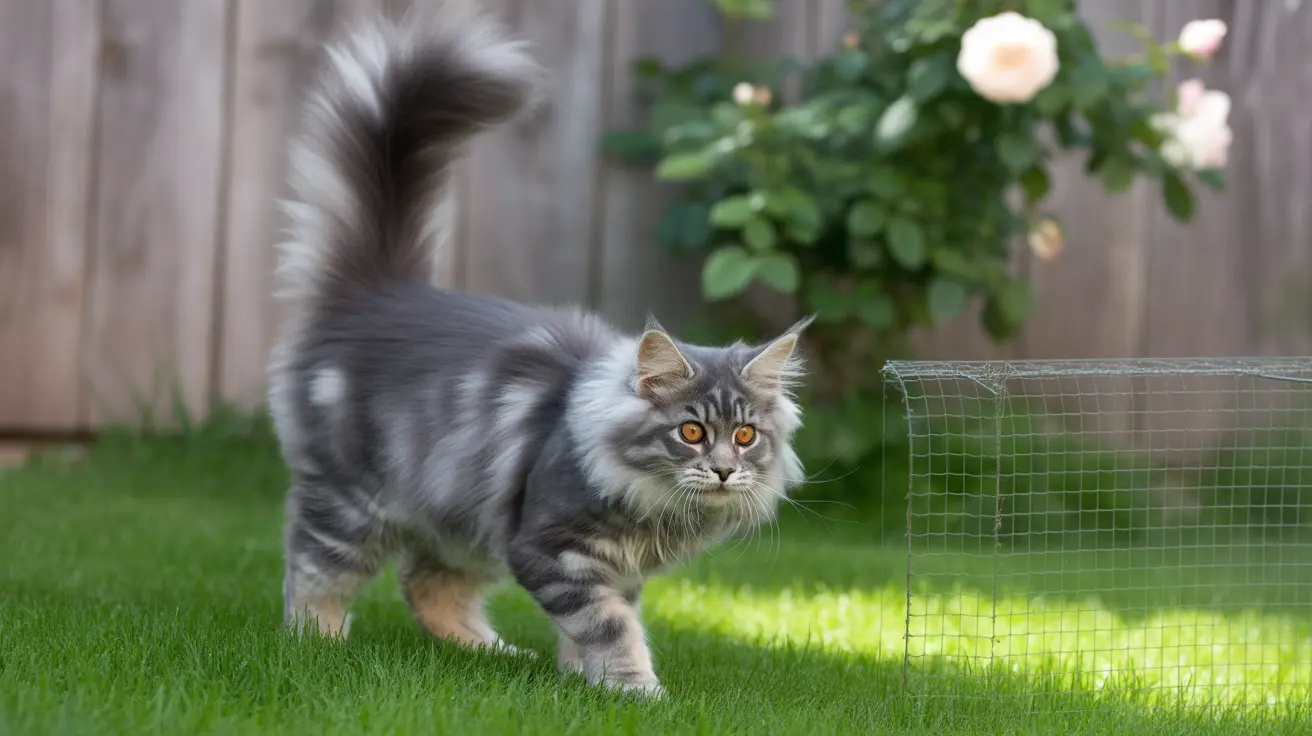猫にとっての除草剤の危険性を理解する
一般的な除草剤には、猫にとって非常に有害な化学物質が含まれており、その中でも特にグリホサートは注意が必要な成分のひとつです。猫は毛づくろいの習慣があるため、処理された場所を歩いた後に足や毛を舐めることで、これらの有害な化学物質を体内に取り込んでしまうことがあります。
除草剤ついた芝生や草むらを猫が散歩することは非常に危険であり、たとえ短時間の接触でも深刻な健康被害を引き起こす可能性があるため、これらのリスクを十分に理解することが重要です。
除草剤の主な有害成分とその影響
商業用除草剤に含まれる以下の化学物質は、猫にとって著しい毒性を持ちます(除草剤 成分 猫 毒性):
- グリホサート:重篤な消化器障害や臓器損傷を引き起こす恐れがあります
- パラコート:極めて有毒で致命的となることもあります
- クロロフェノキシ誘導体:神経系の障害を引き起こす可能性があります
- 硫酸第一鉄:深刻な消化器の乱れを引き起こします
猫の除草剤中毒症状
初期段階の症状(猫 除草剤中毒 どうする、猫 除草剤 舐めたときの症状)
除草剤に触れたり舐めた直後に以下の兆候を注意深く観察してください:
- 過度のよだれ
- 嘔吐や下痢(除草剤 猫 嘔吐 けいれん)
- 元気消失(倦怠感)
- 食欲不振
- 呼吸困難(猫 除草剤 吸い込む リスク)
重症の場合の症状
症状が進行すると、以下のようなより深刻な症状が現れることがあります:
- 筋肉の震えやけいれん
- 発作
- 動きの不調和
- 意識消失や意識混濁
- 臓器不全
猫に安全な雑草対策と代替方法(ペット安全 除草剤、猫に安全な雑草対策)
猫を危険にさらさずに効果的に雑草を管理できるペットにやさしい雑草駆除方法はいくつかあります:
自然由来の解決策
- 酢をベースにした除草剤
- コーングルテンミール(とうもろこし由来の製品)
- 手作業による雑草の引き抜き
- 熱湯処理
予防方法
- 定期的な芝生の手入れ
- 適切なマルチング
- 在来植物の栽培
- 密な地被植物による覆い
除草剤使用時の安全対策(除草剤使用時 猫 安全対策、猫 除草剤回避 方法)
除草剤を使用する際には、以下の安全ガイドラインを必ず守ってください:
- 散布と乾燥完了まで猫を屋内に入れておく
- 製品を猫の届かない安全な場所に保管する
- 濃縮液ではなく既に希釈された製品(使い切りタイプ)を使用する
- 処理したエリアを明確にマーキングする
- 必要に応じて処理エリアに一時的なバリアを設置する
よくある質問
除草剤は猫にとってどれくらい危険ですか?
ほとんどの商業用除草剤は猫にとって安全ではありません。特にグリホサートを含む製品は、猫の健康に深刻な影響を与える可能性があります。ペット安全 除草剤と表示されている場合でも、注意を怠らず、処理部位が完全に乾燥するまで猫を近づけないことが重要です。
猫が除草剤を舐めてしまった場合、どんな症状が出ますか?
主に嘔吐、よだれの過剰分泌、下痢、倦怠感、呼吸困難や異常行動などの症状が現れます。これらの症状(猫 除草剤 中毒 症状)を見かけたら、すぐに動物病院に連絡してください。
猫が除草剤を舐めた時、どのように対処すればよいですか?
直ちに動物病院に連れて行くことが最善です。自宅での応急処置に限界があるため、専門の治療を受けさせることが回復への鍵となります。猫 除草剤 なめた 対処は迅速な対応が重要です。
猫に安全な除草剤や雑草対策方法はありますか?
はい、酢をベースにした自然派除草剤やコーングルテンミール、手作業による除草は猫にやさしい方法です。これらのペットにやさしい雑草駆除方法は、猫への毒性リスクを大幅に減らしますが、処理の際は猫を遠ざけることを忘れないでください。
除草剤散布後、どのくらいの間猫を外に出さない方がいいですか?
少なくとも24〜48時間は猫を外に出さず、処理したエリアが完全に乾くまで待つことを推奨します。特に湿度が高い日や朝露のある場合は、さらに長時間の待機が望ましいです(除草剤 猫 どのくらい待つ)。
グリホサート系除草剤は猫にどんな影響がありますか?
グリホサートは消化器系の重篤な障害や臓器損傷を引き起こす可能性があり、猫の健康に悪影響を及ぼします。グリホサート 猫 影響については特に注意が必要で、触れたり吸い込んだりするリスクを避けることが重要です。
猫が除草剤に皮膚接触・吸入した場合の危険性は?
皮膚に触れたり、除草剤の蒸気を吸い込むことは、深刻な健康被害を招く可能性があり、皮膚の炎症や呼吸器障害を引き起こすことがあります。特に猫は除草剤 吸い込む リスクが高いため、周囲の安全管理が不可欠です。
猫の除草剤中毒の初期症状・重症時の症状は何ですか?
初期症状としては、よだれ過多、嘔吐、下痢、倦怠感、食欲不振、呼吸困難が挙げられ、重症時には筋肉震えやけいれん、発作、不随意運動、意識喪失、臓器不全が見られます(猫 除草剤中毒 症状)。
猫のいる家庭で安全に雑草対策するにはどうしたらいいですか?
手作業での雑草除去、定期的な芝生手入れ、適切なマルチング、密な地被植物の導入などの化学薬品を使わない方法が最も安全です。これらは猫 除草剤回避 方法として効果的であり、猫の健康を守る上で推奨されます。
猫が除草剤で中毒になった場合、動物病院でどんな治療を受けますか?
記事内には具体的な治療法の詳細はありませんが、初期症状の観察と緊急対応が必要であることが強調されています。猫が除草剤による中毒疑いがある場合は、速やかに獣医の診察を受けることが最善の対応です。
猫の健康を守るために除草剤使用時に注意すべきポイントは?
除草剤散布時には猫を屋内に入れ、製品を安全に保管し、処理後は十分に乾燥するまで猫を遠ざけることが重要です。また、ペット安全 除草剤を選びつつも、できる限り自然派の代替法を採用することが望ましいです(猫 草むら 危険物質、猫 除草剤 事故 事例)。
これらのガイドラインに従い、ペットにやさしい除草剤の選び方と対策を取ることで、猫の健康を守りながら効果的な雑草管理が可能となります。迷った際は必ず獣医師に相談し、猫の安全を第一に考慮しましょう。






